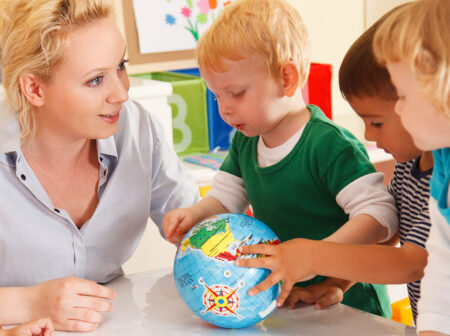
Back to School: The Value of Socialization
It has been a strange and stressful few months for everyone but as families begin sending their children back to childcare and schools begin to reopen, we thought we’d shine a light on the value of school, even for our youngest learners.
Back in July, The Center for Disease Control (CDC) made the case for reopening schools by stating,
“Schools are an important part of the infrastructure of our communities, as they provide safe, supportive learning environments for students, employ teachers and other staff, and enable parents, guardians, and caregivers to work. Schools also provide critical services that help meet the needs of children and families, especially those who are disadvantaged, through supporting the development of social and emotional skills, creating a safe environment for learning, identifying and addressing neglect and abuse, fulfilling nutritional needs, and facilitating physical activity.”
As you can see, schools and childcare programs aid in the development of much more than simply academics. Starting from birth, children are learning who they are by how they are treated. This occurs through daily interactions and relationships. The messages children receive during this time form their self-esteem and other important social skills. When children are able socialize with other children, as well as  observe as their teachers model appropriate social and emotional behaviors, the benefits are astounding.
observe as their teachers model appropriate social and emotional behaviors, the benefits are astounding.
Collaborative for Academic, Social, and Emotional Learning (CASEL) explains, social and emotional competencies can be taught, modeled, and practiced and lead to positive student outcomes that are important for success in school and in life. Decades of research studies demonstrate the following benefits:
Improvement in children’s social and emotional skills, attitudes, relationships, academic performance, and perceptions of classroom and school climate
Decline in students’ anxiety and behavior problems
Long-term improvements in students’ skills, attitudes, prosocial behavior, and academic performance
Schools and childcare centers intentionally create environments allowing for social and emotional learning. The socialization occuring when children are surrounded by their peers gives them opportunities to communicate, listen, collaborate, and empathize all while learning to manage and respond to their own emotions. When children have a strong foundation in these skills, there is a marked improvement in academics (as compared to students lacking social and emotional skills).
We think it’s important to keep this information in mind as you decide to send your child(ren) back into a group education setting. Schools and childcare centers have put policies and procedures into place to ensure the safety of all children and families. If you have any questions or would like to chat with us, please do not hesitate to contact your nearest Ducklings. Our directors would be happy to answer your questions and ease your concerns.
Additional Resources
Zero to Three, Resources on Social and Emotional Development
Collaborative for Academic, Social and Emotional Learning, Social and Emotional Learning in Homes and Communities
PBS for Parents, Social Skills by Age
National Association for the Education of Young Children, Children’s Books for Teaching Social and Emotional Skills
